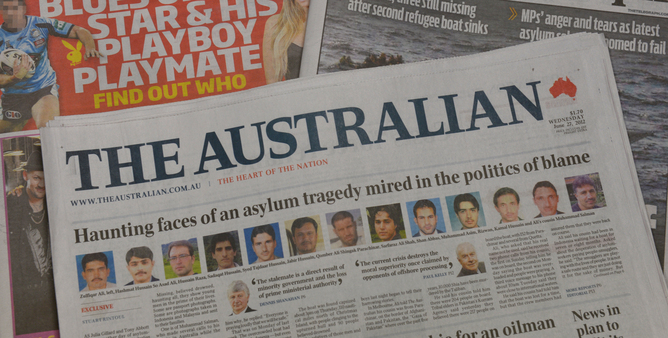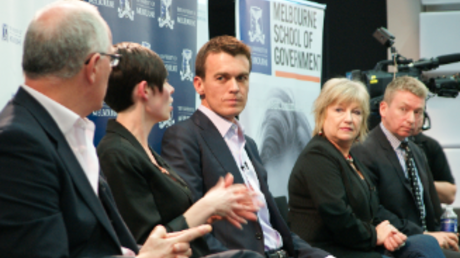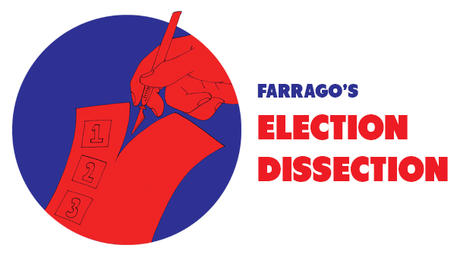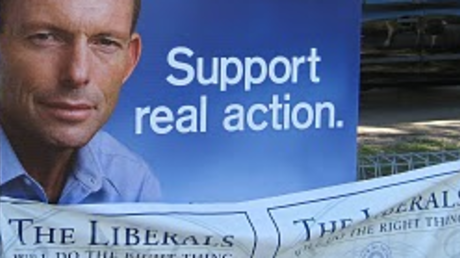
How does a newspaper of strong ideological preferences – such as News Corp broadsheet The Australian – respond when there is a government in office that more closely shares its ideology than did the previous government?
Given the parlous state of Australia’s newspaper industry, this is not an idle question.
The Australian is now the only newspaper of general interest to provide a comprehensive coverage of federal politics. Fairfax’s Australian Financial Review also provides a comprehensive coverage, but it has a narrower audience and tailors its coverage accordingly. The coverage of federal politics by The Age and The Sydney Morning Herald has shrunk considerably by comparison.
Quantity is of course no guarantor of quality, but quantity matters. It has impact: it means a larger presence on the front page, a more insistent and recurring presence inside the paper. It draws attention to itself.
In this way, it sends a signal to all who are interested in federal politics that this is where you are more likely to find such stories – and where you are more likely to find audiences who are interested in them.
This tends to have a self-reinforcing effect: if that is where the stories are likely to be, that is where the audience for them is likely to go, so those with stories for that audience will go there too. In economics this is called the “thick markets” effect: most new activity takes place where most activity already takes place.
This is the thing about newspapers: they have interests, not friends
It has been a clear and consistent strategy of The Australian over many years to create this effect, and the corresponding reduction in breadth of federal political coverage by its serious rivals – The Age and the Sydney Morning Herald – has magnified it.
So, what kind of coverage can we expect from The Australian now that its Labor bogeyman has gone and a government more in tune with its ideological preferences is in office?
The paper’s coverage of prime minister Tony Abbott’s first days in office has been characterised by a propensity to give advice: on foreign policy, trade policy, climate change, the ABC, free speech, the English curriculum, gender balance, debt and credit ratings, gay marriage.
It enjoined Abbott – “a modest man”, in the words of the paper’s editor-at-large Paul Kelly – to not deliver modest government. It instructed him not to let others “set his agenda” on matters such as gay marriage and climate change.
The tone has been honeymoon-ish but scarcely rapturous. Its ardour is really for the ideas rather than for the party or the man (yes).
And this is the thing about newspapers: they have interests, not friends. The interests might be economic or ideological or, most often, a bit of both.
So The Australian will continue to advance its ideological interests both in its news coverage and its commentary. It lost no time on climate change, making the most of the reported findings of the latest review by the Intergovernmental Panel on Climate Change (IPCC) which are said to show that the rate of global warming is slower than was predicted by the computer modelling used for the IPCC’s 2007 report. The semantically sly heading: “We got it wrong on warming, says IPCC”.
On the commentary page was a quite measured piece about the difference between the science and what was described as the apocalyptic visions of some media. Then on two successive days there were editorials on the subject, drawing attention to the distinction between faith and science, and giving a whack to its enemy Fairfax Media for pro-warming bias.
It is probably a good microcosm of how the paper will continue to perform. It will pay attention to the issues that matter to it, giving them a slant that fits with its worldview, backing up its news coverage with commentary that also is consonant with its worldview, and giving its enemies a whack on the way through.
It is not a model of pluralism and it tends to see issues through an ideological lens, but at least it is paying attention to major issues in a way that reinforces the position it has carved out for itself. It knows what it’s doing, in other words.
And we should not forget that it has the capability and willingness to hold government to account. For instance, The Australian joined energetically in the media pursuit of the Howard government over the reprehensible treatment of Dr Mohamed Haneef, a Indian national held in custody for 12 days in 2007 on a baseless suspicion that he had a connection with a failed London bomb plot.
There is a big ideological agenda – industrial relations, the ABC, conservatism in social policy, freedom of speech, to name a few – and we can expect The Australian to be getting on with prosecuting it. If there’s any backsliding by the government, it can expect a whack too.
And Labor will get a kicking just for being Labor.
This article originally appeared in The Conversation




